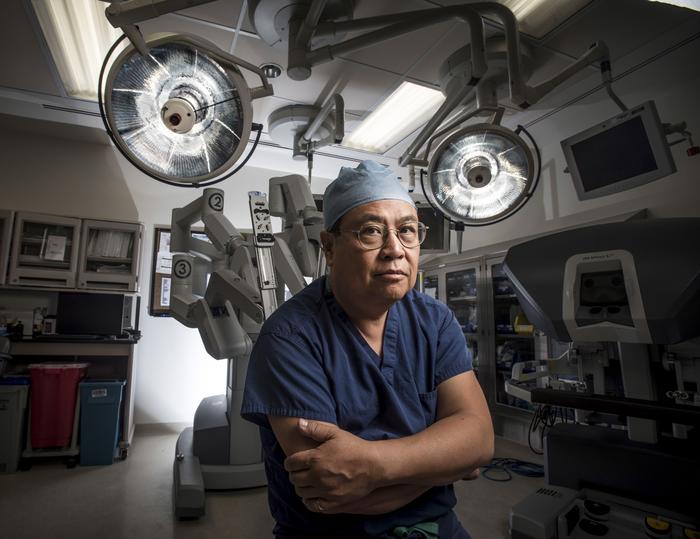LOS ANGELES — A new study guided by a renowned surgeon at City of Hope®, one of the largest cancer research and treatment organizations in the United States, demonstrates that robotic liver surgery can be a safe, outpatient procedure. In fact, 8% of the patients sampled in the analysis were discharged to go home on the same day.

Credit: Photo Credit: City of Hope
LOS ANGELES — A new study guided by a renowned surgeon at City of Hope®, one of the largest cancer research and treatment organizations in the United States, demonstrates that robotic liver surgery can be a safe, outpatient procedure. In fact, 8% of the patients sampled in the analysis were discharged to go home on the same day.
“We have made so much progress in liver cancer. We can now deliver more cures and use less invasive treatment options. This study is proof that for the right patients and with the right tools — meaning robotic surgery — we can get people through a liver operation quicker and toward recovery and normal life faster,” said Yuman Fong, M.D., senior author of the study, Sangiacomo Family Chair in Surgical Oncology at City of Hope and director of City of Hope’s Center for Surgical Innovation.
In the retrospective study, physician researchers evaluated patient data (n=4,408) between 2013 and 2023 from three American cancer centers, including City of Hope, and three Dutch centers.* They identified 307 patients who had received robotic liver surgery as outpatients, which was defined as a procedure requiring less than two nights of hospital stay. While some patients had liver or biliary cancer in a single organ, most patients (n=150) had colorectal cancer that had spread to the liver. Other diagnoses included cancers of the neuroendocrine system, breast and lung that had spread to the liver.
The medical community has been debating about whether liver surgery can and should be a robotic procedure because liver surgery is complex. Bleeding or other surgical complications often arise, requiring admission into the intensive care unit.
“Not long ago, liver resections were considered an open surgery procedure that requires a fairly big incision. Patients oftentimes need to stay in the hospital five to 14 days, and they’re often admitted to intensive care units. Even after leaving the hospital, recovery from such surgeries will often take three to six weeks. In this study of robotic surgery, we found that by one week many of these patients were able to take 5,000 to 6,000 steps,” Fong said.
It is worth noting that the readmission rate of open liver surgery is 20-25% at most major cancer centers, Fong added, yet the readmission rate for robotic hepatectomy was 1.6% in this retrospective analysis of data from six centers in two nations.
On average, readmission cost was $15,200 in 2018. Looking at the big picture, the cost of unplanned hospital readmission in the United States is estimated to be around $30 billion, according to a 2021 article in the Annals of Translational Medicine.
City of Hope embraced robotic surgery very early — in the 2000s, when many in the medical community were skeptics about whether robotic surgery is a safe technique for cancer surgery. Now almost every surgery division at City of Hope uses robotic surgery — from the commonplace robotic prostate surgery to the leading-edge robotic liver surgery. In total, City of Hope surgeons have performed more than 16,000 robotic surgeries.
“Through the entire gamut, City of Hope is looking at different cancers to develop best practices for identifying patients who will benefit the most from robotic surgeries, as well as to clearly state what type of patients with cancer should still receive open surgery to have the best cancer outcome,” Fong said.
# # #
*The other medical centers involved in this study included the University of Washington, Johns Hopkins University School of Medicine, UMC Utrecht, Amsterdam UMC and the Onze Lieve Vrouwe Gasthuis.
The study entitled “Outpatient and Ambulatory Extended Recovery Robotic Hepatectomy: Multinational Study of 307 Cases” was published in the Journal of the American College of Surgeons on May 21, 2024. The research was supported by the Alfred E Mann Family Foundation and by the Natalie and David Roberts family.
About City of Hope
City of Hope’s mission is to make hope a reality for all touched by cancer and diabetes. Founded in 1913, City of Hope has grown into one of the largest cancer research and treatment organizations in the U.S. and one of the leading research centers for diabetes and other life-threatening illnesses. City of Hope research has been the basis for numerous breakthrough cancer medicines, as well as human synthetic insulin and monoclonal antibodies. With an independent, National Cancer Institute-designated comprehensive cancer center at its core, City of Hope brings a uniquely integrated model to patients spanning cancer care, research and development, academics and training, and innovation initiatives. City of Hope’s growing national system includes its Los Angeles campus, a network of clinical care locations across Southern California, a new cancer center in Orange County, California, and cancer treatment centers and outpatient facilities in the Atlanta, Chicago and Phoenix areas. City of Hope’s affiliated group of organizations includes Translational Genomics Research Institute and AccessHopeTM. For more information about City of Hope, follow us on Facebook, X, YouTube, Instagram and LinkedIn.



